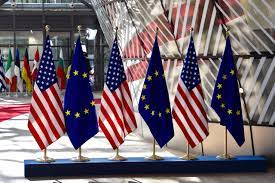Khaled Abou Zahr
French President Emmanuel Macron’s declaration this week on the need for “European sovereignty,” which indicated a desire for independence from the US, created a large debate on both sides of the Atlantic. The main point was the timing of the declaration. Is it a coincidence that Macron made this statement right after his visit to Beijing? The timing made it look more like anti-US posturing rather than pro-European.
Moreover, the declaration of the French president sounded more like a grievance and a clear resentment toward the current war in Ukraine. Although he stated the need for independence on future geopolitical crises, it could easily be interpreted as meaning that the US is at fault for the situation in Ukraine. Added to this was a clear message of a neutral European position vis-a-vis the US’ future relations with China.
One may ask to what extent Macron’s views are reflected among other European leaders and within their countries? Is it a general feeling within Europe? If we focus on the core of the statement and not the timing, then all these plans of Europe being a third global power can and will only work if there is unity and a single policy. This is not the case today.
The EU has been defined by the Franco-German couple. Even more so since the UK left the bloc. However, relations have been tense. At the beginning of this year, German Chancellor Olaf Scholz and Macron met in order to mend relations, especially over defense, energy and finances. It is quite a heavy list. Just before his visit to Washington last month, Scholz had chided China for not condemning Russia and warned it to refrain from delivering weapons to Moscow. One can understand why some analysts were quick to qualify Macron’s declaration as nationalistically mercantile.
Macron had previously stated the need for a European army and he has been systematically calling for greater European planning. He has also repeatedly tried to find a modus vivendi with Vladimir Putin and Russia. This obviously failed. Europe was unable to show enough deterrence toward Moscow and was incapable of putting forward and securing a strategic vision that even Kyiv would respect. For these reasons, we should not be mistaken that there is definitely a need for a stronger European voice and political decision-making. Also, in order to achieve this, there needs to be a unique and exclusive European foreign policy. There cannot be a European agenda and 27 others adjacent to it. That is ridiculous.
In practice, this means that the EU needs to move toward the next step. This next step should be to mutualize resources, whether on foreign policy or defense. This would mean the birth of a European confederation — a confederation with a unique foreign office and unique army. I once stated this necessity to a now-retired French diplomat friend and his answer was swift: “Thank you, Khaled, so you mean we need to send Leclerc tanks all over Europe? Well, no thank you.” I disagreed on the method, as a common vision can achieve the impossible. Today, the conflict in Ukraine is urging Europe to take this bold step. And it is important for this to be anchored within the transatlantic alliance.
European sovereignty should not be a simple declaration that fizzles away with the news cycle, especially as it not only applies to geopolitics but also to the economy and data. Data sovereignty is nonexistent in Europe and the answer to new tech has been to legislate overwhelmingly instead of bolstering innovation. However, things are improving. Lately, a European fund for digital sovereignty has been created and this is an extremely encouraging point. If we look at successful models, such as the European Investment Bank or the European Investment Fund, we notice a true and unique European focus. The same needs to happen in foreign politics and defense. It is time for the European Defense Agency to become an army.
The conflict in Ukraine is a wake-up call. It has also revealed that Russia is now a subpar military threat. It still holds a massive nuclear arsenal and is a master in asymmetric policies, but there are ways to protect Europe from this threat. This means there is a possibility to find a solution, as well as to recalibrate NATO resources to more dangerous issues while strengthening European defenses. More importantly, this can only be achieved if Europe moves urgently toward a unified political voice. If this does not happen, it will only be an economic bloc without any way to protect its interests.
It is impossible in my mind to dissociate Europe from the US and a strong transatlantic alliance. There is an eternal debt to the US and its army. There are 13 American cemeteries in Europe that remind us of the sacrifices the US as a nation made to save the continent. Moreover, despite the criticism, the world — and not only Europe — has been much safer and in a better place as a result of US leadership. Hence, the US needs to regain the hearts and minds of its partners. So, if there are grievances, they should be addressed within a closed dialogue and not through media declarations. But Europe first needs to find its own voice and be aware that any weakening of the transatlantic alliance would have disastrous consequences.







